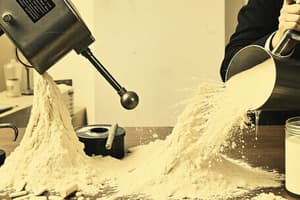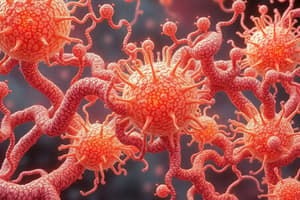Podcast
Questions and Answers
What is the primary principle on which ion exchange chromatography operates?
What is the primary principle on which ion exchange chromatography operates?
- Separation based on solubility
- Separation based on protein charge (correct)
- Separation based on protein conformation
- Separation based on molecular size
Which method is commonly used for the industrial removal of bacterial endotoxins?
Which method is commonly used for the industrial removal of bacterial endotoxins?
- Size exclusion chromatography
- Reversed-phase chromatography
- Centrifugation
- Immuno-affinity chromatography (correct)
In what instances is sterilization particularly necessary for medical products?
In what instances is sterilization particularly necessary for medical products?
- Only for products that are exposed to open air
- For all injectable medications regardless of exposure
- Only for products intended for long-term storage
- For parenteral administration and contacting broken skin (correct)
What specific type of infectious proteins may modern sterilization processes target for removal?
What specific type of infectious proteins may modern sterilization processes target for removal?
What is a crucial aspect of the process of sterilization?
What is a crucial aspect of the process of sterilization?
What is the primary purpose of purification in downstream processing?
What is the primary purpose of purification in downstream processing?
Which method relies on the application of centrifugal force?
Which method relies on the application of centrifugal force?
In the context of purification, what does the term 'MWCO' refer to?
In the context of purification, what does the term 'MWCO' refer to?
Which factor does NOT affect the yield during purification?
Which factor does NOT affect the yield during purification?
What is a common application of precipitation in downstream processing?
What is a common application of precipitation in downstream processing?
What does sedimentation speed primarily depend on?
What does sedimentation speed primarily depend on?
What is the role of sterility checking in downstream processing?
What is the role of sterility checking in downstream processing?
Which of the following processes is NOT used in purification?
Which of the following processes is NOT used in purification?
Which type of microorganism is known to exhibit exceptional resistance to sterilization methods?
Which type of microorganism is known to exhibit exceptional resistance to sterilization methods?
Which sterilization method primarily uses hydrolytic action?
Which sterilization method primarily uses hydrolytic action?
What is the minimum pore size recommended for filtration to effectively remove microorganisms?
What is the minimum pore size recommended for filtration to effectively remove microorganisms?
Which of the following sterilization methods is generally not reliable compared to heat-based methods?
Which of the following sterilization methods is generally not reliable compared to heat-based methods?
What is a major disadvantage of using ethylene oxide for sterilization?
What is a major disadvantage of using ethylene oxide for sterilization?
Which sterilization method is primarily used for heat-sensitive items?
Which sterilization method is primarily used for heat-sensitive items?
In filtration, depth filters function to trap particles within the filter. What is the primary mechanism used?
In filtration, depth filters function to trap particles within the filter. What is the primary mechanism used?
What type of radiation is considered ionizing and requires heavy shielding in facilities?
What type of radiation is considered ionizing and requires heavy shielding in facilities?
Which of the following statements about sterilization methods is false?
Which of the following statements about sterilization methods is false?
What is a key factor in selecting a sterilization method?
What is a key factor in selecting a sterilization method?
Which method is primarily used to assess the success of sterilization by checking for microbial contamination?
Which method is primarily used to assess the success of sterilization by checking for microbial contamination?
Which of the following organisms is commonly used as a biological indicator due to its thermal resistance?
Which of the following organisms is commonly used as a biological indicator due to its thermal resistance?
What is the minimum acceptable microbial safety index indicating a sterilization process?
What is the minimum acceptable microbial safety index indicating a sterilization process?
What type of sterilization indicator visually changes during the heating process?
What type of sterilization indicator visually changes during the heating process?
What does the term 'sterile' refer to in the context of microbial populations?
What does the term 'sterile' refer to in the context of microbial populations?
Which of the following statements about sterilization is true?
Which of the following statements about sterilization is true?
Which physical method is utilized for the optimal testing of pharmaceutical products in terms of sterility?
Which physical method is utilized for the optimal testing of pharmaceutical products in terms of sterility?
What contributes significantly to failures in achieving successful sterilization?
What contributes significantly to failures in achieving successful sterilization?
Flashcards
Ion Exchange Chromatography
Ion Exchange Chromatography
A separation technique where proteins are selectively bound to a solid phase material based on their charge. It can be used to capture proteins of interest or remove unwanted components.
Immunoaffinity Chromatography
Immunoaffinity Chromatography
This method uses specific antibodies to bind and remove unwanted contaminants, such as bacterial endotoxins, from a solution.
Sterilization
Sterilization
A process that removes or kills all living microorganisms, including bacteria, fungi, and viruses, from a solution.
When is sterilization needed?
When is sterilization needed?
Signup and view all the flashcards
Virus Removal
Virus Removal
Signup and view all the flashcards
Purification
Purification
Signup and view all the flashcards
Centrifugation
Centrifugation
Signup and view all the flashcards
Precipitation
Precipitation
Signup and view all the flashcards
Downstream processing
Downstream processing
Signup and view all the flashcards
Adsorption
Adsorption
Signup and view all the flashcards
Micro-filtration
Micro-filtration
Signup and view all the flashcards
Yield
Yield
Signup and view all the flashcards
Removal of contaminants
Removal of contaminants
Signup and view all the flashcards
UV light Sterilization
UV light Sterilization
Signup and view all the flashcards
What is Sterilization?
What is Sterilization?
Signup and view all the flashcards
Methods to check Sterilization
Methods to check Sterilization
Signup and view all the flashcards
Physical and Chemical Sterilization Indicators
Physical and Chemical Sterilization Indicators
Signup and view all the flashcards
Biological Sterilization Indicator
Biological Sterilization Indicator
Signup and view all the flashcards
Sterility Assurance
Sterility Assurance
Signup and view all the flashcards
Sterilization Testing
Sterilization Testing
Signup and view all the flashcards
Membrane Filtration
Membrane Filtration
Signup and view all the flashcards
Microbial Sensitivity
Microbial Sensitivity
Signup and view all the flashcards
Prions
Prions
Signup and view all the flashcards
Disinfection
Disinfection
Signup and view all the flashcards
Steam Sterilization (Autoclave)
Steam Sterilization (Autoclave)
Signup and view all the flashcards
Dry Heat Sterilization (Oven)
Dry Heat Sterilization (Oven)
Signup and view all the flashcards
Gas Sterilization
Gas Sterilization
Signup and view all the flashcards
Filtration Sterilization
Filtration Sterilization
Signup and view all the flashcards
Ionizing Radiation Sterilization
Ionizing Radiation Sterilization
Signup and view all the flashcards
UV Sterilization
UV Sterilization
Signup and view all the flashcards
Study Notes
MPharm Purification & Sterilization
- The presentation covers purification and sterilization within the MPharm program.
- The lecture notes provide a useful reference for purification and sterilization in the MPharm program, as well as Micro courses.
- Learning objectives include introduction to downstream processing, purification, sterilization, different sterilization processes, sterility checking, and sterility testing.
- A diagram outlines the mAb upstream process, from cell bank storage to production/seed bioreactor and primary recovery.
- Purification separates products from production mixtures by removing unwanted components, using methods like sedimentation, precipitation, centrifugation, adsorption, and microfiltration (specified MWCO).
- Purification reduces risks of side effects while maintaining yield, which depends on the number of steps and product loss at each.
- Different yield percentages are shown at various stages of product recovery.
- Downstream processing involves techniques like sedimentation and precipitation, which rely on cell size, density, and mixing speed.
- Sedimentation and precipitation methods lower the solubility of the solute in the media and causes the product to fall out of solution.
- This is useful in production of recombinant DNA polymerases via chemical, temperature, or pH changes.
- Centrifugation uses centrifugal force to separate products, with denser particles moving outwards.
- Adsorption chromatography is used for protein separation. Ion exchange binds proteins to the charge, while immuno-affinity uses antigenic regions to bind unwanted components.
- Sterilization removes all microorganisms, including bacteria, fungi, and viruses (including those in biologically derived therapeutics such as monoclonal antibodies and plasma components). It can also include disabling/destruction/removal of infectious proteins (e.g., Prions, or Transmissible Spongiform Encephalopathies).
- Microbial resistance to various sterilization methods is evaluated; prions show exceptional resistance to most sterilization agents.
- Sterilization methods include steam (autoclave), gas sterilization, filtration, dry heat (oven), and ionizing radiation.
- Filtration removes microorganisms rather than destroying them by size using varying filter grades, pore size, and membrane composition.
- Heat-based sterilization methods use either moist heat (hydrolytic action at >120°C and >1 atm pressure) or dry heat (oxidative action at >150°C) for a wide spectrum of antimicrobial use in inactivating biohazard waste.
- Gas-based sterilization uses ethylene oxide or formaldehyde, often for more temperature-sensitive items like reusable surgical instruments or medical devices.
- Sterilization using radiation includes methods such as ionizing or non-ionizing radiation. Ionizing forms like Gamma or X-rays are common in industrial sterilizing while non-ionizing ultraviolet light has uses in surface disinfection and other forms of sterilization.
- Sterilization success is verified using a combination of physical, chemical, and biological indicators. Physical indicators provide temperature & pressure records. Chemical indicators, such as autoclave tape, visually react to process conditions, and biological indicators demonstrate sterilization success by growing bacteria after the sterilization process if living microorganisms remain.
- Sterility testing verifies that the sterilized product is free from contamination by incubating it in a nutrient medium. Membrane filtration is a common technique.
Sterility Assurance
- Sterility testing involves assessing if a sterilized product is free from microbial contamination by incubation in an appropriate sterile nutrient medium.
- Sterility assurance relies on the understanding that microbial populations decrease exponentially with exposure to the sterilization process, regardless of the initial contamination level.
- Achieving true sterility is theoretically possible but practically takes an infinite time to ensure zero survivors. Testing can minimize microbial contamination but doesn't guarantee 100% sterility.
- The presence of different microbial contaminants will affect the sterilization efficiency.
Additional Information
- Useful references for the study material include the textbook Principles and Practice of Disinfection, Preservation and Sterilization by Russell, Hugo & Ayliffe and the other reading materials from the pharmaceutical microbiology text.
Studying That Suits You
Use AI to generate personalized quizzes and flashcards to suit your learning preferences.





